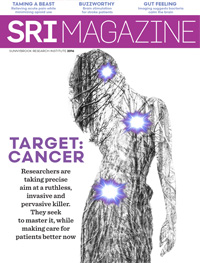- Studies help blood cancer patients make treatment decisions
- Overcoming treatment resistance in cancer
- How can we speed up biopsy for thyroid cancer?
- Targeted therapy for lung cancer helps stem progression and is easier to tolerate
- A new kind of radiotherapy kills brain tumours with pinpoint precision
- Individualizing breast cancer therapy
- "Bespoke" prostate cancer treatment
- A tapestry of clinical trials
- Stomach, pancreatic and other upper GI cancers: new findings are providing much-needed treatment guidance
- Colorectal cancer advances
- Specialist care critical in treating vulvar cancer
- Immunotherapy for melanoma works over the long term: study
- Avoiding invasive end-of-life care in cancer
Other features
Messages
Digest
- Breaching the blood-brain barrier noninvasively: an historic first
- Getting timely post-emerg care: what best predicts It?
- Special delivery
- Caring for caregivers critical
- Aerobic exercise as a “biological probe” in bipolar disorder
- Surveying new territory: physician-assisted death and amyotrophic lateral sclerosis
Short stories
- Have gestational diabetes? Timing of delivery matters
- Optimizing rehab for stroke patients
- Innovative technologies need early-stage investment
Connections

Messages
Delivering impact


Blake Goldring (left) and Dr. Barry McLellan (right)
Photos: Doug Nicholson
Whether it’s discovering a new therapeutic or tailoring a treatment to curtail side effects, teams at Sunnybrook are inventing tomorrow’s health care now. Our strongest exemplifier of this last year was showing that we could breach the blood-brain barrier to deliver chemotherapy to the brain of a patient with brain cancer. This was a world first. (See story here.)
We have many more advances of which we are proud. As the story on high-impact clinical trials at Sunnybrook’s Odette Cancer Centre shows, researchers are striving to ensure treatments are more effective and better suited to each patient. For example, they have shown taking the drug everolimus for neuroendocrine tumours, a disease with debilitating symptoms and few treatments, held progression at bay for 11 months—more than twice as long as a placebo did.
The trial spanned 97 centres in 25 countries, underscoring that collaboration is integral to what we do. That is why our scientists are partnering with a medical device company to develop systems that pair real-time imaging with radiation therapy. These systems will be tested in trials at Sunnybrook, which will be the first centre in Canada where doctors will be able to see tumour response as therapy is given.
The potential benefits to patients from these advances and the others highlighted in this issue are cause for optimism. Such breakthroughs stem from the ingenuity and dedication of our staff, and the generosity of our community. Without you we could not create the future of health care.
Blake Goldring
Chair, Board of Directors
Sunnybrook Health Sciences Centre
Barry A. McLellan
President and CEO
Sunnybrook Health Sciences Centre

Dr. Michael Julius
Photo: Doug Nicholson
We are at the precipice of the most profound change in how we diagnose and treat disease.
Precision medicine seeks to treat and ultimately prevent disease by taking into account individual variability. For example, how patients respond to a therapy—even one that is widely used—is all over the map: it might work brilliantly for some and not at all for others; even when it works, it might have serious adverse effects.
Precision medicine seeks to minimize this ambiguity. It works by collecting and using personal health information to give care that “fits” a person much more closely, based on one’s genetic, cellular and molecular makeup; physiology; lifestyle; environmental influences and other factors; as well as how these factors interact with each other.
One’s genetic profile is perhaps the most important of these, because it is our biology that holds many of the answers regarding the origins and mechanisms of health and disease. Certainly, the most notable advances have been in this arena, emerging from the extraordinary opportunities afforded by the genomics era in which we now live.
Bottom line: precision medicine means focusing on an individual’s disease and a tailored plan for care based on one’s unique “measurements.” We have some distance to travel to get there, but the journey is well underway, as you’ll read in some of the stories in this issue, with its special focus on the research of the Odette Cancer Program.
Enjoy!
Michael Julius
Vice-President, Research
Sunnybrook Research Institute & Sunnybrook Health Sciences Centre
Professor, Departments of Immunology & Medical Biophysics
Faculty of Medicine, University of Toronto
- << SRI Magazine 2016 |
- Previous: Features •
- Next: Digest
- |SRI Magazine 2018 >>



